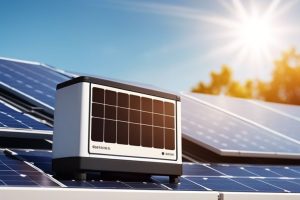Can you run a solar generator continuously?

Pondering whether one can operate a solar generator continuously may surface when planning for extended power needs. However, it is paramount to understand the technical capabilities and limitations of a solar generator to sustain prolonged usage. Continuously running a solar generator is feasible under specific conditions and with careful consideration of factors such as battery capacity, energy consumption, and solar input.
In this guide, we will delve into the nuances of running a solar generator continuously, shedding light on its practicality and functionality for prolonged power requirements.
Key Takeaways:
- Solar generators can be run continuously: Solar generators are designed to be used continuously without any harmful effects, as long as they are properly maintained and within their specified capacity limits.
- Regular maintenance is crucial: To ensure continuous operation of a solar generator, it is essential to perform regular maintenance such as cleaning solar panels, checking connections, and monitoring battery levels.
- Monitor energy consumption: It is important to carefully monitor energy consumption to prevent overloading the solar generator, which can lead to reduced efficiency or damage to the system.
Types of Solar Generators
Some of the different types of solar generators available on the market include portable solar generators and standalone solar power systems. Each type has its own unique features and applications, catering to different needs and preferences.
| Portable Solar Generators | Standalone Solar Power Systems |
| Compact and lightweight | Permanently installed |
| Designed for on-the-go power needs | Used for powering entire households or buildings |
| Easy to transport | Require more space for installation |
| Suitable for outdoor activities like camping and RVing | Provide consistent and reliable power supply |
| May have limited power output | Can be custom-designed for specific energy requirements |
Portable Solar Generators
The portable solar generators are ideal for individuals who are always on the move and require a compact power source. These generators are designed to be lightweight, easy to transport, and suitable for various outdoor activities such as camping, hiking, or picnicking. They offer a convenient way to power small electronic devices, lights, and other essentials while off the grid.
The versatility of portable solar generators makes them popular among outdoor enthusiasts and emergency preparedness advocates. Whether you need to charge your phone on a hiking trip or run a mini fridge during a power outage, portable solar generators provide a reliable and eco-friendly power solution wherever you go.
Standalone Solar Power Systems
Standalone solar power systems, also known as off-grid solar systems, are designed to provide a self-sustaining power source for residential or commercial properties. These systems typically consist of solar panels, inverters, batteries, and other necessary components to generate and store electricity independently from the grid.
For instance, standalone solar power systems are commonly used in remote locations where connecting to the grid is either impossible or cost-prohibitive. These systems can power entire households, farms, or even small communities with clean and renewable energy, reducing dependence on traditional fossil fuels and lowering utility bills in the long run.
Factors Affecting Continuous Operation
One of the key considerations when running a solar generator continuously is understanding the various factors that can affect its operation. By being aware of these factors, you can ensure the smooth and uninterrupted functionality of your solar generator.
- Battery Capacity
- Solar Panel Output
Battery Capacity
Battery capacity plays a crucial role in determining how long a solar generator can run continuously. The capacity of the battery will determine the amount of energy that can be stored and used when sunlight is not available. It is important to choose a solar generator with a battery capacity that aligns with your power needs to ensure continuous operation.
Perceiving the battery capacity as the energy reservoir of your solar generator will help you gauge the duration for which it can run without sunlight. Monitoring the battery levels and recharging them timely will ensure uninterrupted functionality of your solar generator.
Solar Panel Output
With advancements in solar technology, solar panels have become more efficient in converting sunlight into electricity. The output of the solar panels directly impacts the charging speed of the solar generator’s battery. Higher solar panel output means faster recharging times and prolonged operation of the generator.
Any fluctuations in sunlight intensity or shading on the solar panels can affect the output and, consequently, the performance of your solar generator. It is essential to place the solar panels in a location where they receive maximum sunlight throughout the day for optimal operation.
Step-by-Step Tips for Optimal Use
Keep these essential tips in mind to ensure the continuous and optimal performance of your solar generator:
- Place the solar generator in direct sunlight for maximum efficiency.
- Regularly clean the solar panels to prevent dust and debris from affecting performance.
- Monitor the battery levels and recharge as needed to avoid interruptions in power supply.
- Use energy-efficient appliances to prolong the runtime of your solar generator.
- Follow the manufacturer’s instructions for safe operation and maintenance of the unit.
The key to running a solar generator continuously is to take proper care of it and ensure it is positioned correctly for maximum sunlight exposure.
Placement and Positioning
Any obstruction such as trees, buildings, or shading can reduce the efficiency of your solar generator. Position it in an area with minimal shade and maximum sunlight exposure throughout the day. Adjust the angle of the solar panels to align with the sun’s path for optimal energy absorption.
Ensure that the solar panels are kept clean and free of dirt or snow, as these can block sunlight and reduce the efficiency of the generator. Regularly check and clean the panels to maintain maximum efficiency.
Maintenance and Care
Maintenance and care of your solar generator are crucial for its longevity and performance. Regularly inspect the unit for any signs of damage or wear, and address any issues promptly. Keep the battery terminals clean and free of corrosion to ensure a strong connection and efficient power transfer.
Maintenance of the solar generator includes not only cleaning the panels but also checking the wiring and connections for any signs of wear or damage. Regular maintenance will help extend the lifespan of your generator and keep it running smoothly.
Tips: Regularly monitoring the performance of your solar generator and taking proactive steps to ensure its optimal functioning will help you run it continuously with efficiency.
Pros and Cons of Continuous Operation
Not all solar generators are designed to run continuously, and there are important factors to consider when deciding to operate one non-stop. Below is a breakdown of the pros and cons of running a solar generator continuously:
| Pros | Cons |
| 1. Low operating costs | 1. Possible battery degradation |
| 2. Environmentally friendly | 2. Maintenance requirements |
| 3. Energy independence | 3. Limited power output |
| 4. Silent operation | 4. Reliability concerns |
| 5. Off-grid capabilities | 5. Weather-dependent |
Benefits of Running Solar Generators Continuously
Continuous operation of a solar generator can provide a reliable and sustainable source of power. By harnessing energy from the sun, you can reduce your carbon footprint and dependency on traditional energy sources. This can lead to long-term cost savings and environmental benefits.
Additionally, running a solar generator continuously can offer greater energy independence, especially in remote locations or during power outages. With proper maintenance and monitoring, you can enjoy a consistent power supply without relying on the grid.
Challenges and Limitations
Continuous operation of a solar generator may come with challenges and limitations that need to be addressed. Factors such as battery degradation over time, maintenance requirements, and limited power output during cloudy days can impact the overall performance of the system.
Operation of a solar generator continuously requires careful planning and monitoring to ensure optimal functionality. It’s important to consider the potential drawbacks and limitations, such as reliability concerns and weather dependency, before committing to running the system non-stop.
Drawing together the key points discussed, it is indeed possible to run a solar generator continuously provided that it is properly maintained, has sufficient sunlight exposure, and is equipped with a storage system to store excess energy for use during non-sunny periods. By understanding the capabilities and limitations of your solar generator, you can make the most out of this clean and renewable source of energy. Remember to consult the manufacturer’s guidelines and consider your energy needs when deciding on the best way to utilize your solar generator for continuous operation.
FAQ
Q: Can you run a solar generator continuously?
A: Yes, you can run a solar generator continuously as long as it receives an adequate amount of sunlight to recharge its batteries. Most solar generators are designed to operate for extended periods without interruption, making them a reliable source of power for various applications.
Q: How long can a solar generator run continuously?
A: The duration a solar generator can run continuously depends on factors such as its battery capacity, the amount of sunlight it receives for recharging, and the power consumption of the devices connected to it. Some high-capacity solar generators can power essential appliances for several hours or even days without interruption.
Q: Are there any maintenance requirements for running a solar generator continuously?
A: To ensure that a solar generator runs continuously without issues, regular maintenance is essential. This includes keeping the solar panels clean to maximize sunlight absorption, checking and replacing batteries when needed, and monitoring the overall performance of the system. By following recommended maintenance practices, you can prolong the lifespan of your solar generator and keep it running smoothly.
